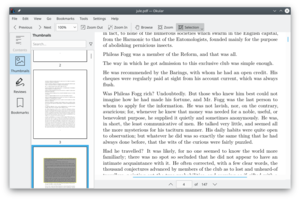Okular
 Okular showing a PDF in KDE Plasma 5 | |
| Original author(s) | Piotr Szymański |
|---|---|
| Developer(s) | KDE |
| Initial release | 2005[1][2] |
| Stable release | 21.08[3]
/ 12 August 2021 |
| Repository | |
| Written in | C++ |
| Operating system | Linux, Unix-like, Windows |
| Type | Universal document viewer |
| License | GPL-2.0-only or GPL-3.0-only |
| Website | okular |
Okular is a multiplatform document viewer developed by the KDE community and based on Qt and KDE Frameworks libraries. It is distributed as part of the KDE Applications bundle. Its origins are from KPDF and it replaces KPDF, KGhostView, KFax, KFaxview and KDVI in KDE 4. Its functionality can be embedded in other applications.
History[]
Okular was started for the Google Summer of Code of 2005 by Piotr Szymański.[1][2] Okular was identified as a success story of the 2007 Season of Usability.[4] In this season the Okular toolbar mockup was created based on an analysis of other popular document viewers and a usage survey.
When it was ported to Qt 5 in December 2016, the version numbering jumped from 0.26 to 1.0.[5]
Since September 2019, Okular is available in the Windows Store.[6]
In December 2020, the software versioning scheme was changed from sequence-based identifier to CalVer.
Features[]
Okular's annotation features include commenting on PDF documents, highlighting and drawing lines, geometric shapes, adding textboxes, and stamps. Annotations are stored separately from the unmodified PDF file, or (since version 0.15 with Poppler 0.20[7]) can be saved in the document as standard PDF annotations.
It is possible to select parts of the document for copying text or image to the clipboard. Other features include reading text aloud using the Qt Speech module part of Qt since Qt 5 (previously using the Jovie,[8][9]), trimming of white page borders and setting of bookmarks.
File format support[]
It supports the following file formats:[10]
- Portable Document Format (PDF) with the Poppler backend
- PostScript with the backend
- Tagged Image File Format (TIFF) with the libTIFF backend
- Microsoft Compiled HTML Help (CHM) with the backend
- DjVu with the DjVuLibre backend
- Device independent file format (DVI)
- XML Paper Specification (XPS)
- OpenDocument format (ODF) (only OpenDocument Text)
- FictionBook (*.fb2)
- ComicBook
- Plucker
- ePub
- Mobipocket
- Various image formats, such as JPG
- Markdown[11]
The official version obeys the DRM restrictions of PDF files by default, which may prevent copying, printing, or converting some PDF files. This can be turned off in the options under "Obey DRM limitations", however.[12][13][14][15]
See also[]
- List of PDF software
- Evince, the counterpart PDF viewer for GNOME
References[]
- ^ a b KDE Developer's Corner - Google Summer of Code 2005 Projects Archived 2006-06-28 at the Wayback Machine
- ^ a b KDE Developer's Corner - Okular Archived 2005-12-11 at the Wayback Machine
- ^ "News".
- ^ Season of Usability Archived 2013-09-25 at the Wayback Machine Published on September 30th, 2007 by Ellen Reitmayr » Okular
- ^ "News".
- ^ "Get Okular".
- ^ "Bug 151614 - store annotations with documents". Archived from the original on 2014-08-19.
- ^ "3 Alternatives to the Adobe PDF Reader on Linux". Linux.com | The source for Linux information. 20 October 2014. Retrieved 2018-09-14.
- ^ Jovie on KDE.org
- ^ Okular - Document format handlers status
- ^ KDE Applications 17.12.0 Full Log Page
- ^ Okular and DRM
- ^ Okular, PDF and file permissions
- ^ Okular, Debian, and copy restrictions
- ^ Debian Bug report logs - #531221 okular: Arbitrarily enforces DRM by default
External links[]
| Wikimedia Commons has media related to Okular. |
- Applications using D-Bus
- EPUB readers
- Free PDF readers
- KDE Applications
- Linux text-related software
- PostScript

